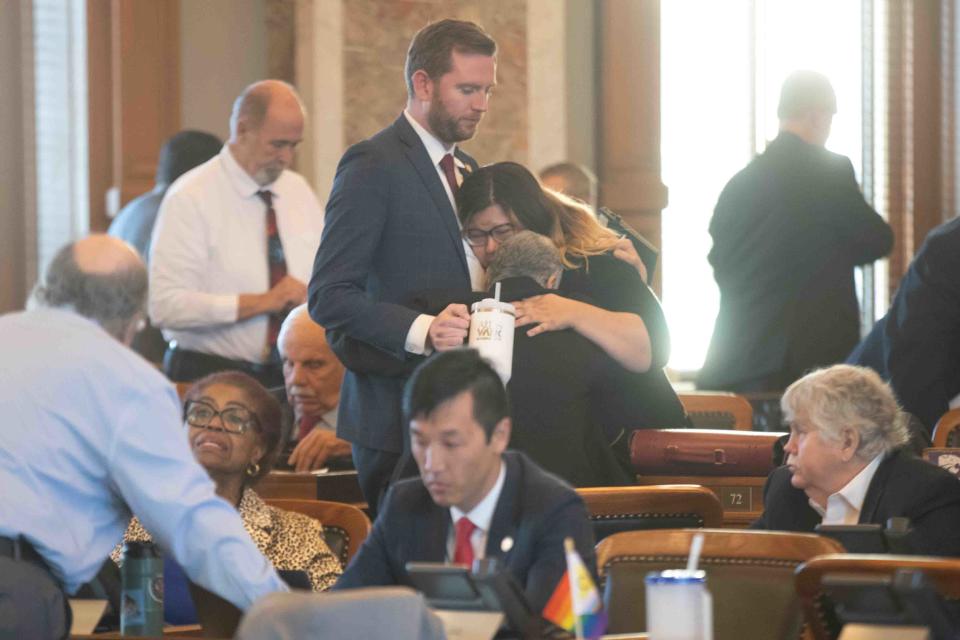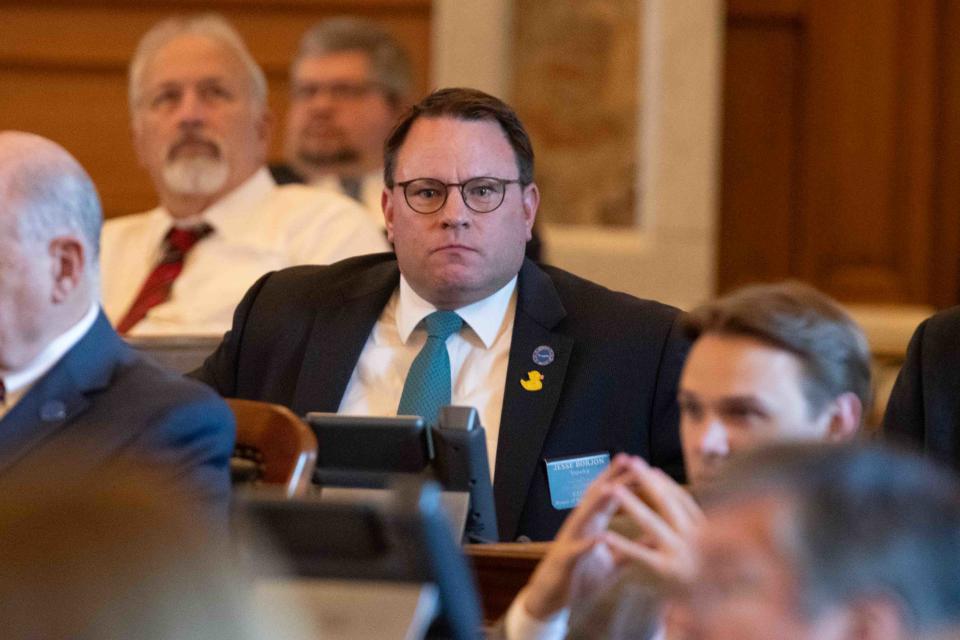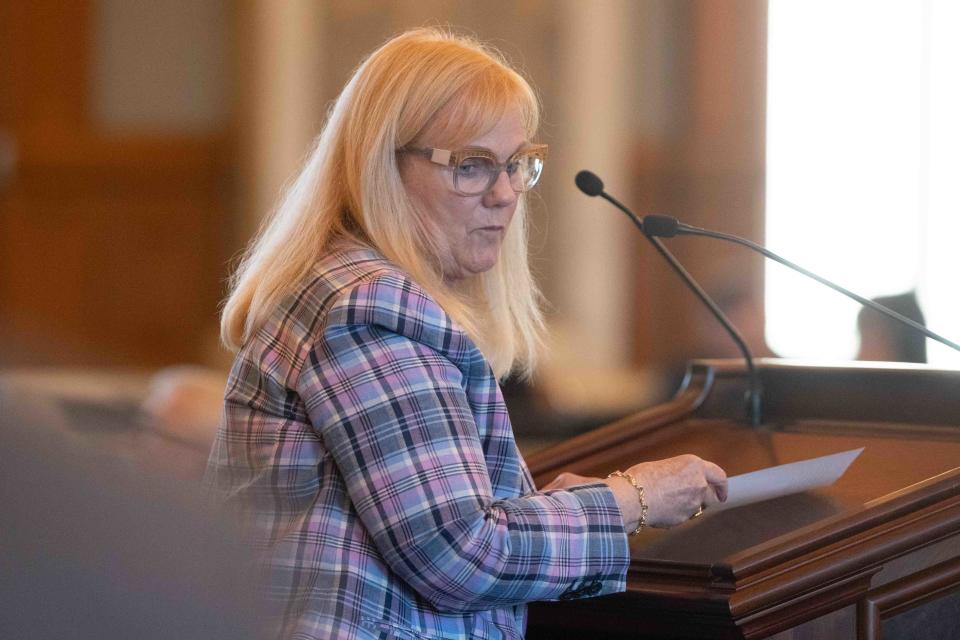Veto override fails, keeping gender-affirming care legal for transgender youths in Kansas
- Oops!Something went wrong.Please try again later.
- Oops!Something went wrong.Please try again later.
Gender-affirming care for transgender youths won't be banned this year after Kansas lawmakers narrowly failed to override Gov. Laura Kelly's veto.
Senate Bill 233 would have banned gender-affirming surgeries and hormone therapy for transgender youths, and some people also interpreted the language to effectively prohibit social transitioning.
While the Senate on Monday got the two-thirds majority it needed to override with a 27-13 vote, the House fell two votes short, 82-43. House Minority Leader Vic Miller, D-Topeka, then made a procedural move to officially kill the bill.
"I am glad that bipartisan members of the legislature have stood firm in saying that divisive bills like House Substitute for Senate Bill 233 have no place in Kansas," Kelly said in a statement. "The legislature's decision to sustain my veto is a win for parental rights, Kansas families, and families looking to call our state home."

The bill's failure came after two House Republicans flipped: Rep. Jesse Borjon, R-Topeka, and Rep. Susan Concannon, R-Beloit.
"I strongly support prohibiting gender reassignment surgery and limiting the use of hormone blockers for minors," Borjon said. "Senate Bill 233 goes too far in restricting mental and behavioral health care for children, which is so desperately needed in these cases. No other state has prohibited providers' speech, and consideration must be given to children currently undergoing treatment."
Borjon said he would support future legislation targeting surgery "without further compromising the care they receive."
Concannon said she likewise has concerns with gender-affirming surgery, but "this bill is vague beyond the surgery."
"We're not listening to the impacted youth," she said. "Government involvement is not the answer."

House Republican caucus meeting showed signs of trouble
Heading into veto session, Republicans appeared poised to override Kelly's veto after failing to do so last session. Several Republicans had flipped this year, though Kelly said she was hoping "some of those legislators who did flip their votes realize that they've made a mistake."
Signs of trouble emerged before the Monday evening vote, which was delayed by GOP leadership for roughly 45 minutes. Earlier in the afternoon, during a House GOP caucus meeting, several representatives urged anyone with cold feet to stick with their previous support of the bill.
Some Republicans suggested that colleagues may have been swayed by concerns that the bill could be interpreted to ban mental health treatment for transgender youths, including medication, that it could effectively ban social transition and that it did not go far enough to protect children currently receiving treatment.
Rep. Kyle McNorton, R-Topeka, said, "We're hearing from our local hospitals that this bill will make it so they cannot treat mental health with drugs."
Rep. Brenda Landwehr, R-Wichita, and Rep. John Eplee, R-Atchison, took the lead in trying to assuage any qualms. They assured legislators the bill wasn't intended to ban medications used to treat mental health, that the language didn't ban teachers from affirming a student's gender identity at school and there was enough time for children to transition off treatment.
While it wasn't in the original version of the bill, legislators later added the provision to allow transgender youths to transition off their treatment through the end of the year in order to win over the support of Sen. Brenda Dietrich, R-Topeka. But the caucus meeting indicated some patients who already had surgery may lose access to medications necessary to prevent complications.
Eplee also acknowledged that some children and their families would likely be forced to seek continued care outside of Kansas if they wanted to continue their treatment.
Landwehr told people considering a no vote that the issue polls well politically.
"They are opposed to what's happening to kids, because kids are not ready to make this decision, and the parents may not be educated enough to do anything but follow what one medical individual recommends," Landwehr said. "If I could, I would make this ban up to the age of 26 or 27 when the brain fully develops."
Likewise, Rep. David Buehler, R-Lansing, said the polling on the issue was "probably the strongest I've heard" on any health bill.
"The reason I voted for it is it keeps a minor child from removing his genitals, period," said Rep. Sean Tarwater, R-Stilwell. "Any parent that would do that to their kid is a sick person."
He also offered political advice.
"If you voted for this once and you're worried about reelection, no one wants a wishy washy person," Tarwater said. "They're going to use it against you either way. You voted for it once. The post card is there. Stand up and fight for it. Be proud you voted to make it end. These people are sick."

Senate Republicans voted to override veto
The bill had supermajority support in the Senate, where supporters of the legislation argued that there isn't enough research to support the effectiveness of affirming practices on minors, and that the ban protects children from overzealous medical professionals.
"The bottom line here is this bill is about protecting children, and with that you ask yourself who you're protecting the children from. Unfortunately, in today's society, the predator is a woke health care system and woke health care providers," said Sen. Mark Steffen, R-Hutchinson.
Sen. Cindy Holscher, D-Overland Park, said the broad language in the bill would "not only punish those seeking care, but it would also punish physicians, teachers and social workers." She also pointed out that many of the proponents who testified in support of the bill came in from out-of-state, while several Kansans opposed it.
Senate Minority Leader Dinah Sykes, D-Lenexa, said lawmakers "are telling our medical professionals that we know best."
Opponents also reiterated a previous argument that anti-transgender legislation could lead to more suicides.
"Research has already identified that due to societal mistreatment, transgender youth have higher rates of suicide attempts and completions than their peers," said Sen. Mary Ware, D-Wichita. "What is the acceptable number of youth suicides?"
"The bottom line here is this bill is about protecting children," Steffen said, "and with that you ask yourself who you're protecting the children from. Unfortunately, in today's society, the predator is a woke health care system and woke health care providers."
How did Topeka legislators vote?
Here's how Topeka legislators voted on the veto override:
Yea: Republican Sens. Brenda Dietrich, Rick Kloos and Kristen O'Shea, and Republican Reps. Ken Corbet and Kyle McNorton.
Nay: Republican Rep. Jesse Borjon, Democratic Reps. John Alcala, Kirk Haskins, Vic Miller, Tobias Schlingensiepen and Virgil Weigel.
This article originally appeared on Topeka Capital-Journal: Kansas Republicans fail to override veto of gender-affirming care ban

